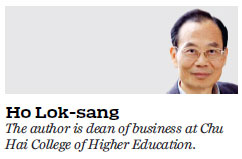The political economy of land is supply, demand
Updated: 2018-05-23 07:54
By Ho Lok-sang(HK Edition)
|
|||||||||
Ho Lok-sang takes issue with the claim that 'rule of developers' is behind the housing shortage, and points to the majority rule
Since the Canadian bestseller Land and the Ruling Class in Hong Kong was translated into Chinese and published in Hong Kong, the term "rule of the developers" has become one of the most popular terms used when people comment on housing problems in Hong Kong. There is little doubt that the term is most influential and most misleading. These days even university scholars who are supposed to know better claim that the problem of high housing prices and rental costs will not be alleviated, let alone solved, even if land supply and housing supply are increased. The problem, they claim, has to do with the institutions which somehow condone the rule of the developers - against the interests of the Hong Kong public.
I venture to argue that the very high housing cost in Hong Kong reflects nothing but supply and demand. Land has been grossly undersupplied in Hong Kong. That had been the case even before 1997, and things got much worse after 2007. According to a document from the Research Office of the Legislative Council Secretariat: "The pace of land creation has slowed down considerably in recent years. Between 2007-09 and 2013-15, the total area of built-up land increased by a mere 1,000 hectares, significantly smaller than that in the preceding years." The extent of the undersupply has been severely aggravated by the surging needs for commercial, industrial and community needs on account of economic growth and demographic trends.
As a result of this shortage, not only housing prices have risen dramatically, but also all categories of real property. In particular, office rent indices have outpaced residential rent indices by far, while the prices of flatted factories have risen much faster than those of all other categories of properties.

A good question is: What is holding back the supply of land? Those who believe in the "hegemony of the developers" might say it is the developers. But some developers have tried very hard to convert some agricultural land that they hold to residential land, and they have been stopped usually by conservationists. Those who believe the special administrative region government subscribes to a "high land price policy" might say it is the government holding back land supply. But the government's effort to increase land supply through reclamation or through converting some green zones to housing or community use has often been blocked. A plan to increase public housing supply by 6,600 units by using the land vacated by the moving of the Sha Tin Sewage Treatment Works and by reclamation near Ma Liu Shui is facing possible obstruction as residents from Ma On Shan worry that the increased density could aggravate traffic problems and the shortfall of community facilities. Recent figures show the queue for public rental housing continues to lengthen. The average wait for a family to be assigned an apartment has risen to 5.1 years. The last time the pledged three-year wait could be honored was, however, not that long ago - 2014 - pointing to the rapid deterioration of the situation in recent years.
In my last article in this column, I had pointed out that Singapore has a population (5.8 million) 22 percent less than ours (7.4 million) but has residential land at least 30 percent more than that of ours (10,000 hectares in 2010 in Singapore cf. 7,666 hectares in 2016 for Hong Kong). If we are to enjoy comparable residential land supply based on our population, we would need 12,760 hectares or an increase of 5,100 hectares of residential land today. If we had that much residential land in Hong Kong, definitely our housing costs would have been much lower. We would have much more living space per family, and the queue for public housing apartments most probably would disappear.
We can be sure anything near this level of residential land supply is not going to happen. The reason is not the rule or hegemony of the developers. Although it is indeed a result of the political economy in the context of Hong Kong, the underlying problem is just the majority rule that is prevalent in most democratic systems.
This will be clear when we look at the housing and population statistics. Last year, 49.5 percent of all households were owner-occupiers. Some 31 percent were public-housing tenants. At least 80.5 percent therefore will not be plagued by housing-price increases. Only about 15 percent of all households in Hong Kong are private tenants. It is almost certain that some of these private tenants may actually be renting out one or more properties for income while renting a place to live in. Thus it is clear that the housing problem that figures so prominently in the public debate is largely a problem for a minority. The problem can be quite grave for some of them but the majority do not really care that much. They are more concerned about preserving the country parks and green belts, making sure that there are parks and amenities for themselves, and a lower population density in their neighborhood.
Developers of course would like to make money. But more often than not they want to increase supply. What is holding back supply is the majority of households who either could benefit from rising housing prices or simply do not care.
(HK Edition 05/23/2018 page8)